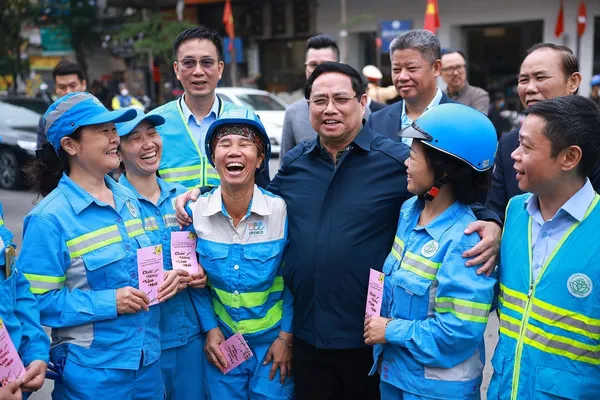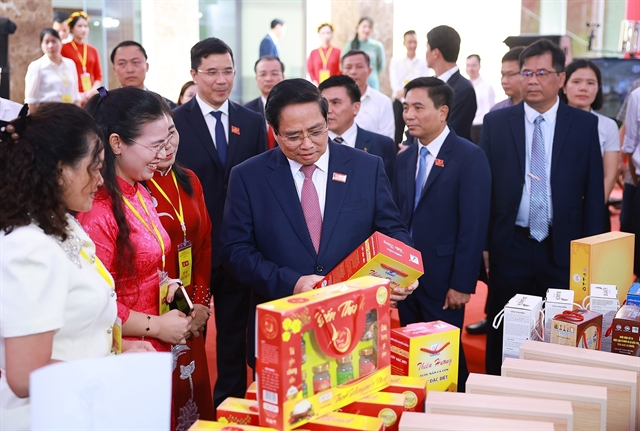 Politics & Law
Politics & Law

 |
| Prime Minister Phạm Minh Chính visits a display of Thanh Hóa Province's socio-economic achievements on the sidelines of the 20th Provincial Party Congress. VNA/VNS Photo Dương Giang |
THANH HÓA — Prime Minister Phạm Minh Chính on Wednesday delivered the keynote speech at the 20th Party Congress of Thanh Hóa Province for the 2025-2030 tenure, highlighting five key tasks for the local Party Organisation, armed forces and people to focus on to achieve set goals.
PM Chính urged the province to fully grasp and implement the resolutions and action programmes of the 14th National Party Congress and its own 20th Party Congress, while promptly realising the recent strategic decisions of the Politburo in key areas.
He emphasised the need to build a clean and strong Party and political system, applying the principles of democratic centralism and intra-Party solidarity with both rigour and flexibility, and operating the two-tier local government model effectively. Thanh Hóa must accelerate the shift from an administrative system focused mainly on procedural tasks to a service-oriented, people-centred administration, while promoting digital government, digital society and digital citizens.
The province should prioritise personnel work as the 'key of the key tasks,' developing a contingent of capable and reputable cadres and Party members, particularly leaders, who meet the demands of the new period. Stronger inspection and supervision mechanisms are needed to prevent and address violations early, and to resolutely fight corruption, wastefulness and negative phenomena, ensuring there are 'no dark or grey zones or those for vested interests.'
The PM called on Thanh Hóa to drive rapid and sustainable economic development through five breakthroughs. These include restructuring the economy and renewing the growth model based on science, technology, innovation and digital transformation; developing green, digital, circular and sharing economies; and stimulating both traditional and new growth drivers.
Thanh Hóa will also focus on four economic growth hubs — Nghi Sơn, Sầm Sơn, Bỉm Sơn and Lam Sơn — proposing mechanisms and policies to turn them into key economic engines for the province. Infrastructure development will be accelerated, particularly in transportation, regional connectivity, digital networks, tourism and services, while harnessing science and technology to tap marine and underground resources effectively.
In addition, the Government leader urged the province to advance socio-cultural development and social welfare, strengthen defence and security capacity and enhance external relations. He called for a peaceful, stable, cooperative and prosperous border with Laos, while promoting the border gate economy as a new driver of regional growth.
The congress reported that during the 2020-2025 tenure, despite intertwined opportunities and challenges, Thanh Hóa’s Party Organisation, government, armed forces and people made comprehensive progress, achieving or surpassing 23 out of 27 targets.
The province’s gross regional domestic product (GRDP) grew by an estimated annual average of 10.24 per cent between 2021 and 2025, ranking fourth nationwide. Its GRDP scale in 2025 is projected to be 1.9 times higher than in 2020, ranking eighth nationwide, while per capita GRDP is expected to reach US$3,750, 1.7 times higher than in 2020.
For 2025-2030, the provincial Party Organisation set key targets and solutions aiming to maintain double-digit annual growth and position Thanh Hóa as a major centre for energy and manufacturing industries, large-scale high-value agriculture, tourism and logistics.
Thanh Hóa aims to rank among the leading localities nationwide by 2030 and become a prosperous, civilised and happy province by 2045. The province targets an average annual GRDP growth rate of 11 per cent or higher in 2026-2030, per capita income of at least VNĐ90 million ($3,415) by 2030, and a digital economy contributing 30 per cent of GRDP.
Total investment is expected to reach VNĐ840 trillion or more, with exports valued at VNĐ15 billion and the urbanisation rate exceeding 50 per cent. At least 90 per cent of Party grassroots organisations are expected to successfully complete their annual tasks. VNA/VNS




